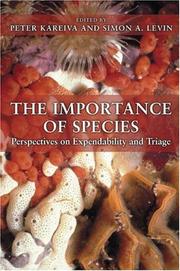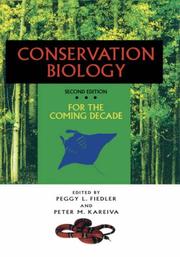| Listing 1 - 10 of 16 | << page >> |
Sort by
|
Article
Abstract | Keywords | Export | Availability | Bookmark
 Loading...
Loading...Choose an application
- Reference Manager
- EndNote
- RefWorks (Direct export to RefWorks)
Article
Abstract | Keywords | Export | Availability | Bookmark
 Loading...
Loading...Choose an application
- Reference Manager
- EndNote
- RefWorks (Direct export to RefWorks)
Book
ISBN: 0199589003 1283264935 9786613264930 0191621420 9780191621420 6613264938 9780199588992 0199588996 9780199589005 9781283264938 9780191621031 019162103X Year: 2011 Publisher: Oxford [England] New York Oxford University Press
Abstract | Keywords | Export | Availability | Bookmark
 Loading...
Loading...Choose an application
- Reference Manager
- EndNote
- RefWorks (Direct export to RefWorks)
In 2005, The Millennium Ecosystem Assessment (MA) provided the first global assessment of the world's ecosystems and ecosystem services. It concluded that recent trends in ecosystem change threatened human wellbeing due to declining ecosystem services. This bleak prophecy has galvanized conservation organizations, ecologists, and economists to work toward rigorous valuations of ecosystem services at a spatial scale and with a resolution that can inform public policy. The editors have assembled the world's leading scientists in the fields of conservation, policy analysis, and resource economics
Ecosystem services. --- Human ecology. --- Ecosystem management. --- Biodiversity conservation. --- Environmental policy.
Book
ISBN: 1936221063 9781936221066 Year: 2011 Publisher: Greenwood Village (Colo.): Roberts,
Abstract | Keywords | Export | Availability | Bookmark
 Loading...
Loading...Choose an application
- Reference Manager
- EndNote
- RefWorks (Direct export to RefWorks)

ISBN: 0691090041 069109005X 1400866774 132257216X 9781400866779 9780691090047 9780691090054 Year: 2003 Publisher: Princeton
Abstract | Keywords | Export | Availability | Bookmark
 Loading...
Loading...Choose an application
- Reference Manager
- EndNote
- RefWorks (Direct export to RefWorks)
A great many species are threatened by the expanding human population. Though the public generally favors environmental protection, conservation does not come without sacrifice and cost. Many decision makers wonder if every species is worth the trouble. Of what consequence would the extinction of, say, spotted owls or snail darters be? Are some species expendable? Given the reality of limited money for conservation efforts, there is a compelling need for scientists to help conservation practitioners set priorities and identify species most in need of urgent attention. Ecology should be capable of providing guidance that goes beyond the obvious impulse to protect economically valuable species (salmon) or aesthetically appealing ones (snow leopards). Although some recent books have considered the ecosystem services provided by biodiversity as an aggregate property, this is the first to focus on the value of particular species. It provides the scientific approaches and analyses available for asking what we can expect from losing (or gaining) species. The contributors are outstanding ecologists, theoreticians, and evolutionary biologists who gathered for a symposium honoring Robert T. Paine, the community ecologist who experimentally demonstrated that a single predator species can act as a keystone species whose removal dramatically alters entire ecosystem communities. They build on Paine's work here by exploring whether we can identify species that play key roles in ecosystems before they are lost forever. These are some of our finest ecologists asking some of our hardest questions. They are, in addition to the editors, S.E.B. Abella, G. C. Chang, D. Doak, A. L. Downing, W. T. Edmondson, A. S. Flecker, M. J. Ford, C.D.G. Harley, E. G. Leigh Jr., S. Lubetkin, S. M. Louda, M. Marvier, P. McElhany, B. A. Menge, W. F. Morris, S. Naeem, S. R. Palumbi, A. G. Power, T. A. Rand, R. B. Root, M. Ruckelshaus, J. Ruesink, D. E. Schindler, T. W. Schoener, D. Simberloff, D. A. Spiller, M. J. Wonham, and J. T. Wootton.
575.858 --- Species. Speciation --- 575.858 Species. Speciation --- Conservation biology. --- Species diversity. --- Endangered species. --- Biodiversity conservation. --- Biodiversity --- Biological diversity conservation --- Conservation of biodiversity --- Diversity conservation, Biological --- Gender mainstreaming in biodiversity conservation --- Maintenance of biological diversity --- Preservation of biological diversity --- Endangered animal species --- Endangered animals --- Endangered wildlife --- Threatened animal species --- Threatened animals --- Threatened species --- Threatened wildlife --- Vanishing species --- Vanishing wildlife --- Wildlife, Endangered --- Wildlife, Threatened --- Wildlife, Vanishing --- Diversity, Species --- Richness, Species --- Species richness --- Conservation --- Biodiversity conservation --- Endangered species --- Species diversity --- Conservation biology --- Ecology --- Nature conservation --- Species --- Wildlife conservation --- Rare animals --- Conservation of natural resources --- Ecosystem management

ISBN: 041209651X 0412096617 1461560519 1475728824 1475728808 Year: 1998 Publisher: New York (N.Y.) : Chapman and Hall,
Abstract | Keywords | Export | Availability | Bookmark
 Loading...
Loading...Choose an application
- Reference Manager
- EndNote
- RefWorks (Direct export to RefWorks)
Refecting what a new generation of conservation biologists is doing and thinking, this vital and far ranging second edition explores where conservation biology is heading. It challenges many conventions of conservation biology by exposing certain weaknesses of widely accepted principles. Combining contributions from both the school and the new breed of conservation biologists, this insightful text focuses primarily on topics the are integral to the daily activities of conservation biologists. Several chapters address ecosystem restoration and biotic invasions as well as the the mechanics of population viability analyses, which are now a routine facet of conservation efforts. A case history approach is implemented throughout the book, with the use of practical real-world examples. Furthermore, an in-depth look at quantitative analyses is presented, allowing for models and mathematical analyses to pinpoint limitations in existing data and guide research toward those aspects of biology that are most likely to be critical to the dynamics of a species or an ecosystem.
502.35 --- 574 --- 57 --- Conservation biology --- #WDIR:wbse --- Ecology --- Nature conservation --- Conservation management in general. Monitoring --- General ecology. Biocoenology. Hydrobiology. Biogeography --- Biologische wetenschappen in het algemeen. Biologie --- Conservation biology. --- 574 General ecology. Biocoenology. Hydrobiology. Biogeography --- 502.35 Conservation management in general. Monitoring --- Biologie de la conservation --- Evolutionary biology. --- Conservation Biology/Ecology. --- Nature Conservation. --- Environmental Management. --- Evolutionary Biology. --- Ecology . --- Nature conservation. --- Environmental management. --- Ecology. --- Animal evolution --- Animals --- Biological evolution --- Darwinism --- Evolutionary biology --- Evolutionary science --- Origin of species --- Biology --- Evolution --- Biological fitness --- Homoplasy --- Natural selection --- Phylogeny --- Environmental stewardship --- Stewardship, Environmental --- Environmental sciences --- Management --- Conservation of nature --- Nature --- Nature protection --- Protection of nature --- Conservation of natural resources --- Applied ecology --- Endangered ecosystems --- Natural areas --- Balance of nature --- Bionomics --- Ecological processes --- Ecological science --- Ecological sciences --- Environment --- Environmental biology --- Oecology --- Population biology --- Conservation --- Economic geology. --- Economic Geology. --- Economic geology --- Physical geology --- Mines and mineral resources
Book
ISBN: 0191846686 Year: 2017 Publisher: Oxford : Oxford University Press,
Abstract | Keywords | Export | Availability | Bookmark
 Loading...
Loading...Choose an application
- Reference Manager
- EndNote
- RefWorks (Direct export to RefWorks)
This edited volume assembles some of the most intriguing voices in modern conservation biology. Collectively they highlight many of the most challenging questions being asked in conservation science today, each of which will benefit from new experiments, new data, and new analyses.
Book
ISBN: 9780198808978 Year: 2018 Publisher: Oxford, United Kingdom : Oxford University Press,
Abstract | Keywords | Export | Availability | Bookmark
 Loading...
Loading...Choose an application
- Reference Manager
- EndNote
- RefWorks (Direct export to RefWorks)
This edited volume assembles some of the most intriguing voices in modern conservation biology. Collectively they highlight many of the most challenging questions being asked in conservation science today, each of which will benefit from new experiments, new data, and new analyses. The book's principal aim is to inspire readers to tackle these uncomfortable issues head-on. A second goal is to be reflective and consider how the field has reacted to challenges, and to what extent these challenges advance conservation science. A concluding chapter will synthesize common themes that emerge from the experiences of the authors in these debates and discuss how best to guard against confirmation bias. The hope is that this book will lead to greater conservation of ecosystems and biodiversity by harnessing the engine of constructive scientific scepticism in service of better results.--
Book

ISBN: 9780691188362 Year: 2018 Publisher: Princeton, NJ
Abstract | Keywords | Export | Availability | Bookmark
 Loading...
Loading...Choose an application
- Reference Manager
- EndNote
- RefWorks (Direct export to RefWorks)
Digital

ISBN: 9780691188362 Year: 2018 Publisher: Princeton, N.J. Princeton University Press
Abstract | Keywords | Export | Availability | Bookmark
 Loading...
Loading...Choose an application
- Reference Manager
- EndNote
- RefWorks (Direct export to RefWorks)
| Listing 1 - 10 of 16 | << page >> |
Sort by
|

 Search
Search Feedback
Feedback About UniCat
About UniCat  Help
Help News
News